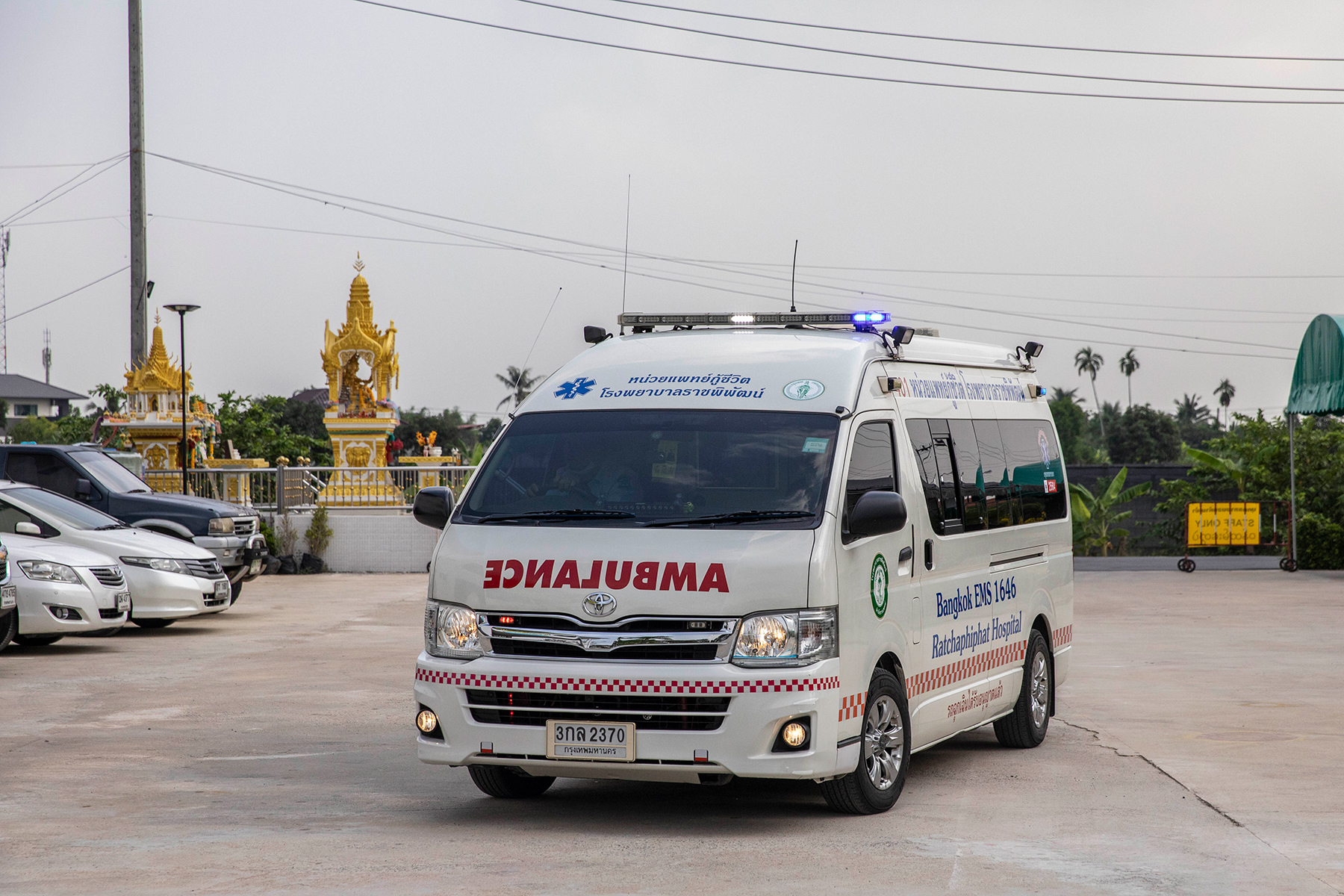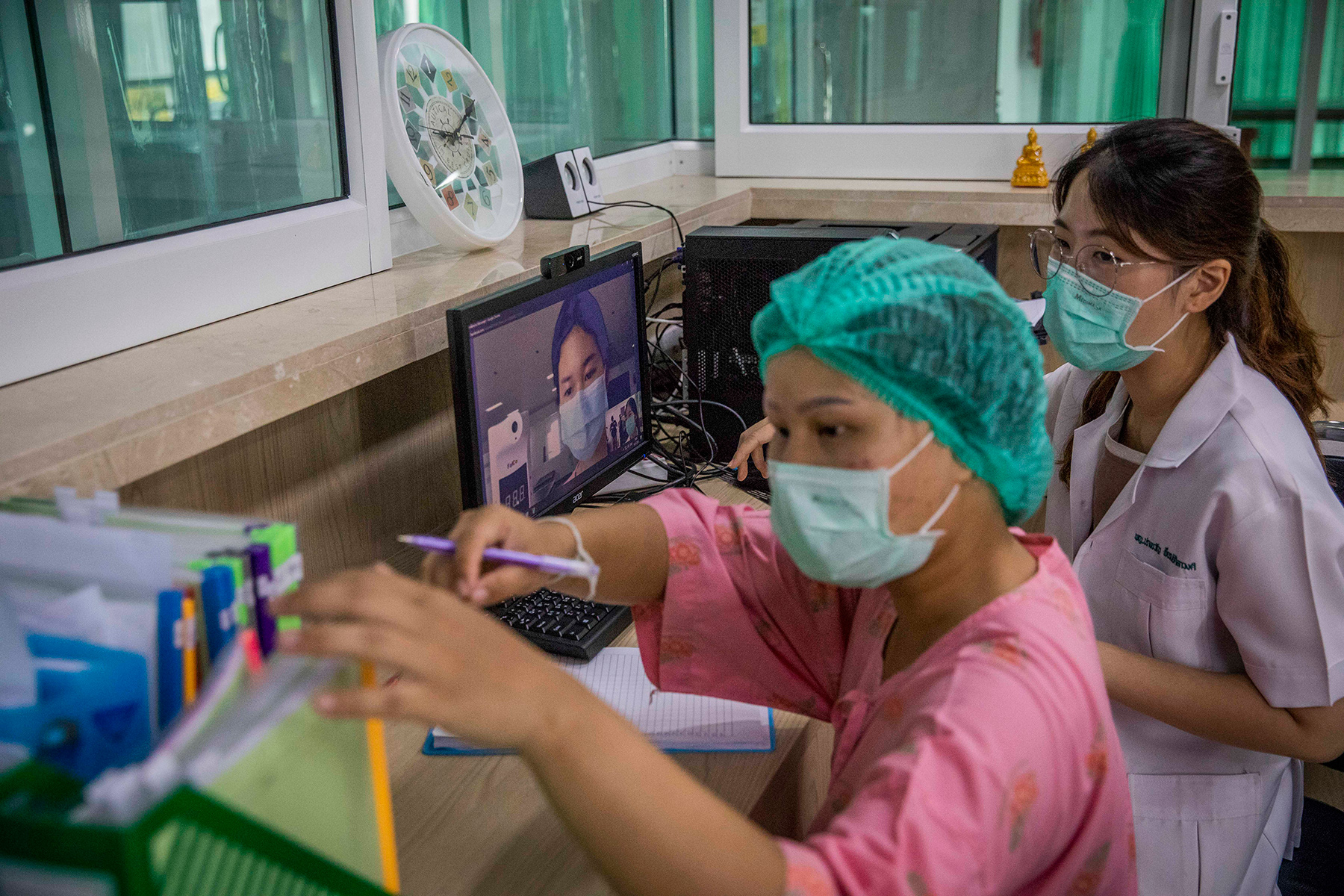Thailand’s healthcare system is funded through taxes and health insurance. There are three main schemes, and which one applies to you depends on your nationality and employment status. All Thai citizens have the right to universal public healthcare, as do some internationals working in the public or civil service sector.
However, some internationals, such as those who are unemployed, will require private health insurance.
Find out what public health insurance covers, whether you’re entitled to it, and how to get private insurance in the following sections:
- How does the Thai healthcare system and insurance work?
- Who needs health insurance in Thailand?
- Public health insurance in Thailand
- How do you apply for public health insurance in Thailand?
- Private health insurance in Thailand
- Health insurance costs and reimbursements
- What if you are unemployed or earn a low income?
- Useful resources
Allianz Care
Allianz Care is a world leader in providing international health insurance. Their various premiums provide professionally designed solutions for a variety of expat lifestyles. So, wherever your life takes you, make sure you have the right health protection for you and your family with Allianz Care.
How does the Thai healthcare system and insurance work?
Thailand introduced a universal public healthcare system in 2002 that has greatly improved the health outcomes of its population. Under this system, all citizens in Thailand get mostly free public healthcare funded in part by taxation. People working in the private sector make payments from their salary toward public health insurance.
Alongside public healthcare facilities in Thailand, there is also a network of private healthcare, including many hospitals and clinics. You’ll need to take out your own health insurance policy to access these.
Who needs health insurance in Thailand?
Those not entitled to public healthcare in Thailand require private health insurance. This includes expats moving to Thailand without the intention to work, as they do not pay into the social security system and, therefore, cannot access universal public healthcare.
Purchasing private health insurance, in this case, is a legal requirement and usually a stipulation of Thai visa applications. Minimum coverage is currently ฿100,000. Short-term visitors to Thailand also need private health insurance, which forms part of their visa application requirements.
What happens if I do not have health insurance?
If you don’t have health insurance in Thailand and are not eligible for free public healthcare, you may not access any medical treatment other than emergency services. You will also be billed for any emergency care you receive.

As an expat, you normally need proof of health insurance policy as part of your visa application. Even if you come in on a work visa and can access public healthcare through social security payments, you may need to take out private insurance to cover your initial period in Thailand.
Public health insurance in Thailand
In 2020, government spending made up 70.4% of overall public healthcare spending.
Initially, public health insurance in Thailand can seem confusing. There are three main schemes: one for civil servants, another for private sector workers, and the Universal Coverage Scheme (UCS – ทธิหลักประกันสุขภาพแห่งชาติ ส.ป.ส.ช.), which covers the rest of the population.
Who is covered by public health insurance?
You should check with your employer whether you are eligible for public health insurance. However, the following table gives an overview of how the system works:
| Name of scheme | Who is covered? | How do you make payments? | Percentage of population |
| Civil Servant Medical Benefit Scheme (CSMBS – สวัสดิการรักษาพยาบาลข้าราชการ) | Civil servants and government employees | Through taxation | 19% |
| Social Security Scheme (SSS – ระบบประกันสังคม) | Private sector workers | Workers and their employers make payments through social security. These are based on salary. | 7.7% |
| Universal Coverage Scheme (UCS) | Public sector workers Self-employed Thai citizens Unemployed Thai citizens | Through taxation | 71.3% |
Although these schemes are aimed at Thai citizens, many expats in the public sector or civil service automatically qualify for public healthcare. This is also the case if your private employer is signed up for state social security. If the SSS covers you, your insurance payments might also cover dependent family members. Check with your employer to find out whether this applies. Otherwise, you will need a private health insurance policy.
There are also smaller schemes that cover the rest of the Thai population. These include policies for:
- Local administrative officers (0.96% of people)
- Private school teachers (0.12%)
- Qualified non-registered workers (0.1%)
- Disability schemes (0.02%)
- Stateless people (0.78%).
Who is not covered by public health insurance?
Although the state social security system covers a large percentage of the international population, it excludes certain groups, such as:
- Retirees not planning to work
- Students on a course at a Thai university or educational institution
- Those staying in Thailand for a limited period only, for example, tourists or those staying with families
Individuals belonging to these groups will need to get a valid private health insurance plan.
What is covered by Thai public health insurance?
If you have public health insurance in Thailand, the good news is this covers most of your healthcare costs without the need to pay anything out of pocket. The exception is if you use services on a Saturday, where small charges apply. However, it’s essential to check your policy to find out if you need to make additional co-payments.
Treatments covered include:
- General practitioner and specialist visits
- Hospital stays and surgery costs in public facilities
- Prescription costs
- Emergency healthcare
- Most children’s healthcare
- Rehabilitative care, for example, physiotherapy, to recover from illness or injury
- Long-term nursing care
- Maternity costs when having a baby, for example, hospital costs and costs for prenatal and postnatal support
- Basic dental treatment
- Preventative healthcare, such as cancer screenings
- Some mental healthcare, for example, psychiatric treatment with a referral
- Birth control
- Alternative medicine, such as Thai Traditional Medicine (TTM – การแพทย์แผนไทย)
- Vaccines
- Abortion costs (up to a limit of ฿3,000)
- Sick pay of up to 50% of your salary for up to six months if you cannot work due to illness or injury

Healthcare not covered by the universal healthcare scheme includes:
- Physiotherapy not linked to rehabilitative recovery
- Cosmetic treatments, for example, plastic surgery or teeth whitening
- Extensive dental surgery, for example, root canal treatment
- Mental healthcare such as psychotherapy, unless with a referral
- Alternative medicine other than TTM
- Fertility treatment
You can take out private health insurance in Thailand to cover anything not included in public healthcare.
How do you apply for public health insurance in Thailand?
Employers are responsible for registering their employees for public health insurance in Thailand. This means that if you’re eligible, you won’t need to worry about registering or applying for healthcare.
Once your employer has signed you up, you should receive a social security card (gold card) to take to healthcare appointments when using public services. You will be automatically registered to the public healthcare unit (healthcare center, clinic, or community hospital) in your local district in Thailand.
Private health insurance in Thailand
Who should get private health insurance?
Private health insurance in Thailand is worth considering if you:
- Aren’t eligible for public health insurance coverage. For example, if you move to Thailand without a job, your visa application will require you to have a private health insurance policy.
- Want the best available healthcare in Thailand; although public services are of a high standard, there are many private hospitals and clinics with state-of-the-art facilities and top-level professionals.
Short-term visitors on a temporary visa to Thailand will need a private medical insurance policy as part of their visa application.
Cigna Global
Want access to the best private medical services in Thailand? Speak to the healthcare professionals at Cigna Global today and find a policy that’s right for you. Take advantage of their global network of doctors, specialists, therapists and more with coverage tailor-made for you and your family. If you’re starting a new life in Thailand, get peace of mind with Cigna Global.
What are the advantages of getting private health insurance?
Benefits of private health insurance coverage in Thailand include:
- Access to extra services: Although the universal coverage scheme covers much of Thailand’s healthcare needs, it doesn’t cover everything. For example, extensive dental surgery is omitted. Private insurance can ensure that all your health needs are met.
- Shorter waiting times: Public health services can sometimes be overcrowded. Private services generally offer speedier consultation and treatment.
- English-speaking staff: You are more likely to find your English language needs met in the private sector. This could be a factor if you don’t speak the local language.
- Tailored services: When you purchase private health insurance, you can usually select what you need and opt out of anything surplus to your requirements. This is more user-friendly than the one-size-fits-all approach of public insurance.
- Avoiding full healthcare costs: If you use healthcare services in Thailand without any sort of insurance coverage, you will be billed for the entire amount.
- Overseas coverage: Only private international health insurance in Thailand offers coverage outside the country’s borders.
- Freedom of choice of provider: Private insurance gives you the power to choose where you are treated.
How does private health insurance work?
If you buy private health insurance in Thailand, you essentially have a choice between:
- Local private insurance, which covers private services in Thailand
- International private insurance, which offers global coverage both inside and outside of Thailand

Insurance costs and processes generally depend on your insurance provider. Charges will be heavily influenced by factors such as:
- Personal risk factors including age, medical status, and lifestyle
- The extent of your coverage – what you choose to include in your plan and your total claim limit
- How many people are on the policy
With private insurers in Thailand, you typically have to settle costs upfront and then file for reimbursement. However, insurers often pay large bills upfront.
The Office of Insurance Commission (OIC) (สำนักงานคณะกรรมการกำกับและส่งเสริมการประกอบธุรกิจประกันภัย คปภ) regulates the insurance industry in Thailand. You can find details of regulated insurance companies on the OIC website.
How do you choose a health insurance provider?
When looking for private health insurance in Thailand, you should consider a wide range of factors other than price. This will help you to choose the package that’s right for you. Things to consider include:
- To what extent can you tailor the policy? Is everything you want included, and have you eliminated anything unnecessary?
- What incentives or special offers are there? For example, can you save money by paying for the whole year upfront or get discounts with partner companies when you sign up?
- Are there options to lower premiums by paying more on a deductible/excess?
- What is consumer feedback like for the company? Have a look at reputable review sites.
- How easy are the processes? Can you sign up, claim, or cancel your policy online?
- Does the company rate well for ethics and sustainability? You can check websites such as CSRHub and Corporate Knights.
You can compare private health insurance in Thailand on sites such as Mister Prakan and Pacific Prime.
Private health insurance companies in Thailand
If you need a policy from a private health insurance company, the following insurers operate in Thailand:
APRIL International
Looking for expat-friendly health insurance in Thailand? APRIL International has a long history of providing health coverage tailored to the unique needs of the expat lifestyle, ensuring peace of mind for you and your family. Whether you’re relocating to Thailand or simply staying short-term, APRIL International has the right policy for you.
Health insurance costs and reimbursements
Private sector workers paying into the country’s social health insurance scheme contribute 1.5% of their monthly salary towards insurance costs, up to a maximum of ฿750 a month. Both the employer and the government match this.
These payments are automatic deductions from employee wages, so workers don’t have to worry about making any manual payments. In return, they get mostly free public healthcare and will only need to pay upfront for any additional fees. For example, costs applied for medical services delivered on Saturdays.
What if you are unemployed or earn a low income?
Thailand’s universal health coverage system means that all citizens can access free healthcare no matter what their economic or social situation.
However, things are different for non-citizens in Thailand. You will not be able to access public healthcare as an expat unless you are working and paying into the social security system. Those moving to Thailand without the intention to work are expected to purchase private health insurance and have enough money to cover general living costs, including medical fees.
Useful resources
- National Health Security Office (NHSO) (สำนักงานหลักประกันสุขภาพแห่งชาติ สปสช) – manages the universal public healthcare service for Thai citizens
- Office of Insurance Commission (OIC) – regulates the insurance industry in Thailand







